Magy Seif El-Nasr
Assessing the Impact of Personality on Affective States from Video Game Communication
Sep 22, 2023Abstract:Individual differences in personality determine our preferences, traits and values, which should similarly hold for the way we express ourselves. With current advancements and transformations of technology and society, text-based communication has become ordinary and often even surpasses natural voice conversations -- with distinct challenges and opportunities. In this exploratory work, we investigate the impact of personality on the tendency how players of a team-based collaborative alternate reality game express themselves affectively. We collected chat logs from eleven players over two weeks, labeled them according to their affective state, and assessed the connection between them and the five-factor personality domains and facets. After applying multi-linear regression, we found a series of reasonable correlations between (combinations of) personality variables and expressed affect -- as increased confusion could be predicted by lower self-competence (C1), personal annoyance by vulnerability to stress (N6) and expressing anger occured more often in players that are prone to anxiety (N1), less humble and modest (A5), think less carefully before they act (C6) and have higher neuroticism (N). Expanding the data set, sample size and input modalities in subsequent work, we aim to confirm these findings and reveal even more interesting connections that could inform affective computing and games user research equally.
Modeling Player Personality Factors from In-Game Behavior and Affective Expression
Aug 27, 2023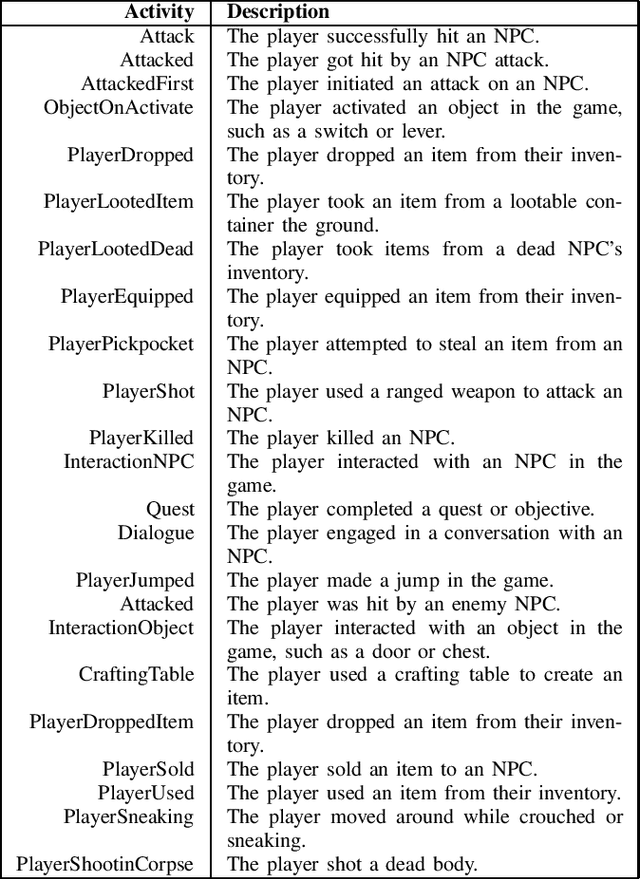


Abstract:Developing a thorough understanding of the target audience (and/or single individuals) is a key factor for success - which is exceptionally important and powerful for the domain of video games that can not only benefit from informed decision making during development, but ideally even tailor game content, difficulty and player experience while playing. The granular assessment of individual personality and differences across players is a particularly difficult endeavor, given the highly variant human nature, disagreement in psychological background models and because of the effortful data collection that most often builds upon long, time-consuming and deterrent questionnaires. In this work, we explore possibilities to predict a series of player personality questionnaire metrics from recorded in-game behavior and extend related work by explicitly adding affective dialog decisions to the game environment which could elevate the model's accuracy. Using random forest regression, we predicted a wide variety of personality metrics from seven established questionnaires across 62 players over 60 minute gameplay of a customized version of the role-playing game Fallout: New Vegas. While some personality variables could already be identified from reasonable underlying in-game actions and affective expressions, we did not find ways to predict others or encountered questionable correlations that could not be justified by theoretical background literature. Yet, building on the initial opportunities of this explorative study, we are striving to massively enlarge our data set to players from an ecologically valid industrial game environment and investigate the performance of more sophisticated machine learning approaches.
Empathetic AI for Empowering Resilience in Games
Feb 16, 2023


Abstract:Failure and resilience are important aspects of gameplay. This is especially important for serious and competitive games, where players need to adapt and cope with failure frequently. In such situations, emotion regulation -- the active process of modulating ones' emotions to cope and adapt to challenging situations -- becomes essential. It is one of the prominent aspects of human intelligence and promotes mental health and well-being. While there has been work on developing artificial emotional regulation assistants to help users cope with emotion regulation in the field of Intelligent Tutoring systems, little is done to incorporate such systems or ideas into (serious) video games. In this paper, we introduce a data-driven 6-phase approach to establish empathetic artificial intelligence (EAI), which operates on raw chat log data to detect key affective states, identify common sequences and emotion regulation strategies and generalizes these to make them applicable for intervention systems.
EvolvingBehavior: Towards Co-Creative Evolution of Behavior Trees for Game NPCs
Sep 01, 2022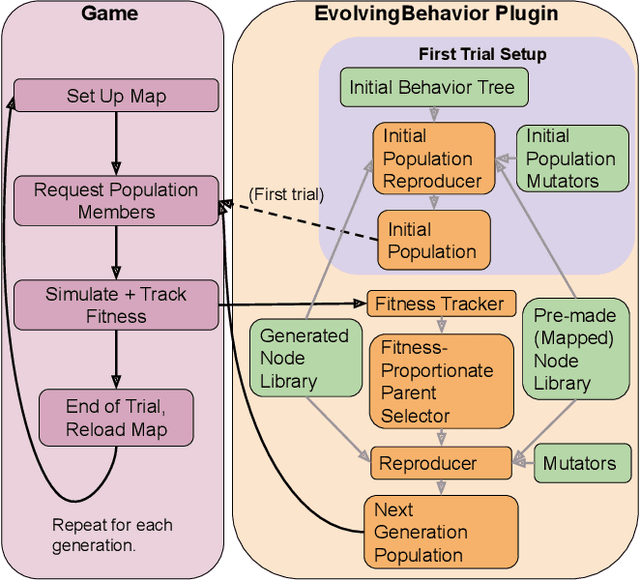
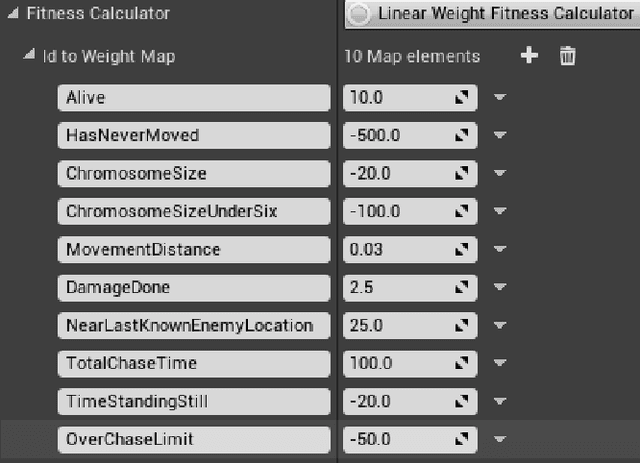
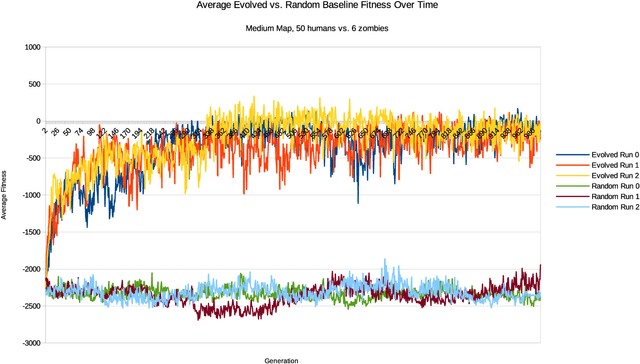
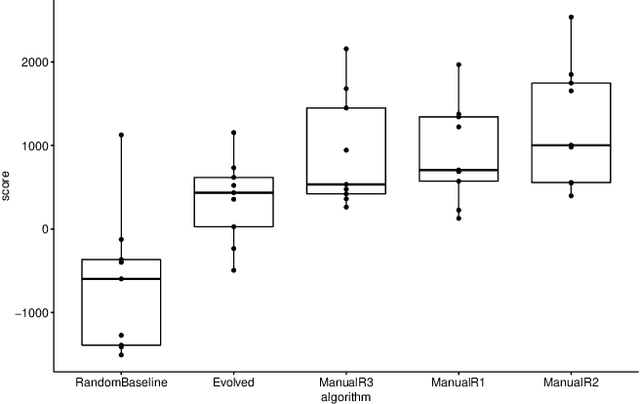
Abstract:To assist game developers in crafting game NPCs, we present EvolvingBehavior, a novel tool for genetic programming to evolve behavior trees in Unreal Engine 4. In an initial evaluation, we compare evolved behavior to hand-crafted trees designed by our researchers, and to randomly-grown trees, in a 3D survival game. We find that EvolvingBehavior is capable of producing behavior approaching the designer's goals in this context. Finally, we discuss implications and future avenues of exploration for co-creative game AI design tools, as well as challenges and difficulties in behavior tree evolution.
Open Player Modeling: Empowering Players through Data Transparency
Oct 12, 2021

Abstract:Data is becoming an important central point for making design decisions for most software. Game development is not an exception. As data-driven methods and systems start to populate these environments, a good question is: can we make models developed from this data transparent to users? In this paper, we synthesize existing work from the Intelligent User Interface and Learning Science research communities, where they started to investigate the potential of making such data and models available to users. We then present a new area exploring this question, which we call Open Player Modeling, as an emerging research area. We define the design space of Open Player Models and present exciting open problems that the games research community can explore. We conclude the paper with a case study and discuss the potential value of this approach.
Design-Driven Requirements for Computationally Co-Creative Game AI Design Tools
Jul 29, 2021
Abstract:Game AI designers must manage complex interactions between the AI character, the game world, and the player, while achieving their design visions. Computational co-creativity tools can aid them, but first, AI and HCI researchers must gather requirements and determine design heuristics to build effective co-creative tools. In this work, we present a participatory design study that categorizes and analyzes game AI designers' workflows, goals, and expectations for such tools. We evince deep connections between game AI design and the design of co-creative tools, and present implications for future co-creativity tool research and development.
Advancing Methodology for Social Science Research Using Alternate Reality Games: Proof-of-Concept Through Measuring Individual Differences and Adaptability and their impact on Team Performance
Jun 25, 2021



Abstract:While work in fields of CSCW (Computer Supported Collaborative Work), Psychology and Social Sciences have progressed our understanding of team processes and their effect performance and effectiveness, current methods rely on observations or self-report, with little work directed towards studying team processes with quantifiable measures based on behavioral data. In this report we discuss work tackling this open problem with a focus on understanding individual differences and its effect on team adaptation, and further explore the effect of these factors on team performance as both an outcome and a process. We specifically discuss our contribution in terms of methods that augment survey data and behavioral data that allow us to gain more insight on team performance as well as develop a method to evaluate adaptation and performance across and within a group. To make this problem more tractable we chose to focus on specific types of environments, Alternate Reality Games (ARGs), and for several reasons. First, these types of games involve setups that are similar to a real-world setup, e.g., communication through slack or email. Second, they are more controllable than real environments allowing us to embed stimuli if needed. Lastly, they allow us to collect data needed to understand decisions and communications made through the entire duration of the experience, which makes team processes more transparent than otherwise possible. In this report we discuss the work we did so far and demonstrate the efficacy of the approach.
VINS: Visual Search for Mobile User Interface Design
Feb 10, 2021



Abstract:Searching for relative mobile user interface (UI) design examples can aid interface designers in gaining inspiration and comparing design alternatives. However, finding such design examples is challenging, especially as current search systems rely on only text-based queries and do not consider the UI structure and content into account. This paper introduces VINS, a visual search framework, that takes as input a UI image (wireframe, high-fidelity) and retrieves visually similar design examples. We first survey interface designers to better understand their example finding process. We then develop a large-scale UI dataset that provides an accurate specification of the interface's view hierarchy (i.e., all the UI components and their specific location). By utilizing this dataset, we propose an object-detection based image retrieval framework that models the UI context and hierarchical structure. The framework achieves a mean Average Precision of 76.39\% for the UI detection and high performance in querying similar UI designs.
The Art of Drafting: A Team-Oriented Hero Recommendation System for Multiplayer Online Battle Arena Games
Jun 26, 2018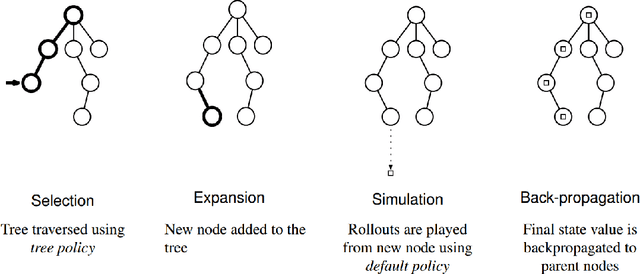



Abstract:Multiplayer Online Battle Arena (MOBA) games have received increasing popularity recently. In a match of such games, players compete in two teams of five, each controlling an in-game avatars, known as heroes, selected from a roster of more than 100. The selection of heroes, also known as pick or draft, takes place before the match starts and alternates between the two teams until each player has selected one hero. Heroes are designed with different strengths and weaknesses to promote team cooperation in a game. Intuitively, heroes in a strong team should complement each other's strengths and suppressing those of opponents. Hero drafting is therefore a challenging problem due to the complex hero-to-hero relationships to consider. In this paper, we propose a novel hero recommendation system that suggests heroes to add to an existing team while maximizing the team's prospect for victory. To that end, we model the drafting between two teams as a combinatorial game and use Monte Carlo Tree Search (MCTS) for estimating the values of hero combinations. Our empirical evaluation shows that hero teams drafted by our recommendation algorithm have significantly higher win rate against teams constructed by other baseline and state-of-the-art strategies.
Q-DeckRec: A Fast Deck Recommendation System for Collectible Card Games
Jun 26, 2018


Abstract:Deck building is a crucial component in playing Collectible Card Games (CCGs). The goal of deck building is to choose a fixed-sized subset of cards from a large card pool, so that they work well together in-game against specific opponents. Existing methods either lack flexibility to adapt to different opponents or require large computational resources, still making them unsuitable for any real-time or large-scale application. We propose a new deck recommendation system, named Q-DeckRec, which learns a deck search policy during a training phase and uses it to solve deck building problem instances. Our experimental results demonstrate Q-DeckRec requires less computational resources to build winning-effective decks after a training phase compared to several baseline methods.
 Add to Chrome
Add to Chrome Add to Firefox
Add to Firefox Add to Edge
Add to Edge